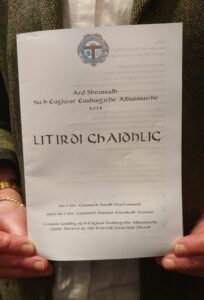The afternoon session of Day 2 at General Synod 2024 heard the Primus, Bishop Mark Strange, report that the College of Bishops has undertaken the beginning of a training programme alongside USPG to address historic links with the slave trade.
USPG representative Carol Miller, the Church Engagement Officer, was present at St Paul’s & St George’s in Edinburgh as a guest, to hear the update from the Primus.
The College members want to examine their own unconscious bias and how this effects the way they lead the church, and there is currently exploration of how to link with the Province of the West Indies in seeking ways to address some of these issues.
The Primus had been invited to join a pilgrimage to Jamaica alongside the Moderator of the General Assembly of the Church of Scotland and the UK moderator of the United Reformed Church. This had been organised by an ecumenical group in Jamaica.
“The trip was transformative,” the Primus told Synod. “We met with politicians, the British High Commissioner, we visited and spoke in schools and colleges, and we visited churches and former plantations. We met with so many people who were delighted to meet with us and who wanted to build on relationship.
“Clearly there was always a question of reparation, what could or should we offer, what did or didn’t we know, and to what extent was the institution of the SEC involved in the horrors of chattel slavery. The fact that Scotland was involved is clear by the surnames that are so common in Jamaica – surnames of families across Scotland.
“We know that indenture servants sent from Scotland to the West Indies became slave owners and we know that a number of local industries supplied the slave trade. The other element was the investments of people into the company’s running the trade, those who received reparation for the loss of their slaves and income.
“We now need to look into the history of our own churches, while at the same time considering how we might help develop something that would encourage greater fellowship with the West Indies and enable us to offer something back.”
Earlier in the afternoon, the second session from the Faith & Order Board included two motions by the Liturgy Committee, the first of which (Motion 24) was intended to add the Liturgies for Lent, Holy Week and Easter to the Schedule to Canon 22, meaning they will have progressed from experimental use to authorised use, and to begin the process of removing the previous version of the 1982 Scottish Liturgy (which was been revised in 2022), leaving the revised version as the authorised version.
A series of amendments to Motion 24 were proposed by the Very Rev Kelvin Holdsworth, Glasgow & Galloway, after discussion at the Glasgow & Galloway Diocesan Synod which were intended to offer alternative language. The amendments provoked an engaging theological discussion about the intent and function of liturgy in our churches.
Provost Holdsworth commented at the beginning of the debate that he was “offering this because I think that the work of liturgy in our church is important, and has affected me and so many of us. The work of the liturgy committee through the years is astonishing, because it changes the way we think about our faith.”
Bishop Ian Paton, responding to the proposals, indicated that there was a collaborative and experimental process for writing new liturgies, and that he would welcome these proposals being tested within this process. The Rev Markus Dünzkofer, Diocese of Edinburgh, spoke in favour of one of the amendments indicating that he was pleased that the General Synod had the opportunity to express an opinion on this matter. These amendments, which required a two-thirds majority in each house, were rejected, while an earlier amendment was carried, and the amended motion was also carried.
Synod was also given a presentation from the Institute Council, and heard reports from the Investment Committee and the Buildings Committee. Tribute was paid and thanks given to Mr Jim Gibson as he introduced the Administration Board session for the final time, as he stands down as Convener.
At the end of the day’s business, the Gaelic Society of the Scottish Episcopal Church held a Eucharist at St Paul’s & St George’s, led by Canon Simon Mackenzie.
–

